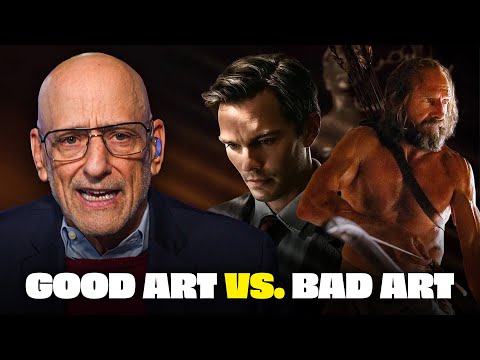In a world saturated with superhero flicks and box-office behemoths, the arts have become a reflection of society’s collective conscience—or, in many cases, a rather warped mirror obscured by layers of CGI and melodrama. A recent video commentary has struck a resounding note, arguing that while mainstream cinema busies itself with flash and noise, true artistry delves deep into the human condition, exposing both our virtues and our failings. Let’s take a stroll through two cinematic offerings: one that panders to a childish fixation on realism (or lack thereof), and another that courageously wrestles with profound moral dilemmas.
First up on our cinematic seesaw is a purported retelling of Homer’s Odyssey, a film that has managed to throw the foundational heroics of the original tale right out the window. Imagine a grandiose romantic saga where the epic confrontation between Odysseus and a bunch of troublesome suitors transforms into a drab commentary on the futility of war. It’s as if someone decided to swap out the profound struggle between man and fate for a meandering dissertation on the psychological toll of post-war trauma—#Boring. While the film boasts a lavish visual palette and a star-studded cast, it seems to trade fidelity to the source material for a modernist nihilism that adds little to the collective cultural vocabulary. A tragically misguided narrative choice leaves audiences yearning for the supernatural depth of the Greek gods rather than a dose of detached realism.
Flash forward to the second film, Clint Eastwood’s “Juror Number Two,” which attempts to tackle the sticky ethics of justice in an unforgiving world. Here, we meet a juror who grapples with the reality that a good man may be wrongfully punished while a truly guilty party slips through the cracks. Unlike our earlier film that sidesteps heroism in favor of dreary introspection, this film exhumes the noble spirit of moral inquiry. This isn’t just eye-candy for viewers; it’s a daring exploration of what justice means when the invisible hand of morality is weighed against the fragility of human existence. As the characters navigate the murky waters of guilt, responsibility, and consequence, they engage the audience in serious conversations about what it means to do right in a world rife with complexities.
The brilliance of “Juror Number Two” lies in its insistence on truth, even when it’s uncomfortable. Eastwood masterfully reminds us that while life offers no easy answers, grappling with fundamental principles of justice and morality doesn’t dilute their significance—it enhances it. The word “God” appears not as mere backdrop but as a guiding light that interrogates the very nature of justice. In a culture prone to infantilizing its heroes and downplaying the weightiness of existence, this film cuts through the fluff with a palpable seriousness.
Perhaps the cultural landscape is overdue for a shift, moving away from the pseudo-heroics of the comic book canon toward narratives that dazzle not with explosions but with the intricate dance of ethics and human imperfection. The urge to dumb down our cinematic experiences must be curbed—the masses deserve more than an avalanche of predictable narratives. Instead of relying on flashy suits and superhuman abilities, why not embrace stories that illuminate the human experience, delving into the grit and grime of moral dilemmas?
So, while one film trudges along like a sad-sack hero lamenting modernity, the other offers both a reflection and a challenge. The arts, when true to their purpose, can inspire societal introspection rather than just entertain us with flashy flight. With filmmakers like Eastwood still grappling with such narratives, there’s hope yet that the heart of culture can move away from mindless inertia and toward a renaissance of meaningful storytelling. It’s time for a cultural Christmas wish to come true: that we might foster an environment where art stirs the soul rather than numbs it—where the heroes are flawed, the dilemmas profound, and the conversations enduring.



